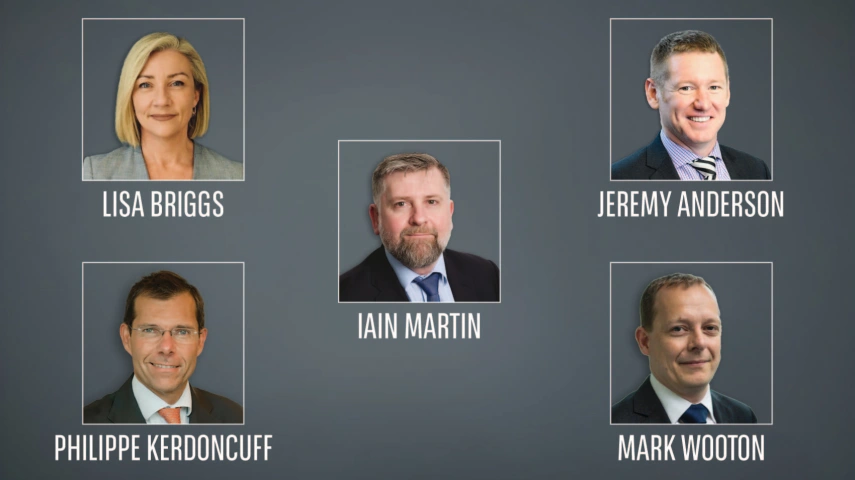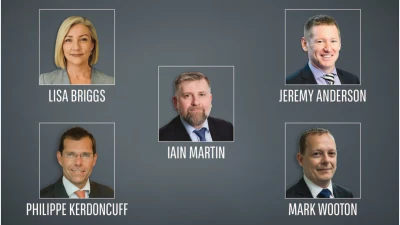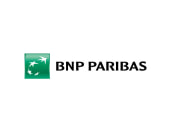BNP Paribas driving global capabilities & local expertise in Australia & New Zealand



Shaping the future: discover how global custodians are driving innovation through digital solutions in the Australian and New Zealand markets.
Unique and evolving markets require custodians with both global capabilities and local expertise.
For tourists, Australia and New Zealand offer their natural wonders, cosmopolitan cities, and laid-back vibes; for financial institutions, custodians, and exchange operators, primary attractions are stable economies, fast-growing pension plans, and modernising market infrastructure.
As the Australia and New Zealand markets develop, high-level trends include consolidation, among asset managers as well as custody providers; internationalisation, in the form of expanded access to global markets; and asset servicers stepping up to meet institutions’ increasing need for digital solutions.
A key in the capital markets ecosystem is the custodian, or asset servicer, which provides custody, safekeeping, clearing, and administration of securities held by institutions. Custodians are especially important in relatively small yet evolving markets such as Australia and New Zealand, where inbound capital flows are rising, domestic asset owners are seeking global investments, and all parties want better technology and more efficiencies in trading and clearing.
“Offshore investments into the local markets and the domestic investment from the buy side into the markets are critical, and custodians play an important role here, as we see a lot of flow going through our books and onto the exchange,” said Mark Wootton, Co-Head of the Financial Intermediaries and Corporates Client Line in Asia Pacific, Securities Services, BNP Paribas. “Where we add value specifically is on offshore investments into these markets, where we can demystify and give clients one view, whether they’re transacting in Hong Kong SAR, India, New Zealand, Australia, or elsewhere.”
“Custodians are enablers for investors – we’re the ones that do all the behind the scenes work – and also understand client requirements,” Wootton said. “There’s also an element of bringing economies of scale, which means providing a price point for which it makes sense for clients to transact in these markets.”
Pension Systems
Any discussion of capital markets in Australia and New Zealand starts with their national systems for workplace pensions plans. Australians had AU$3.9 trillion invested as superannuation assets as of March 2024, according to the Association of Superannuation Funds of Australia (ASFA)[1], and that number is projected to increase to as much as $6.5 trillion by 2030. The two largest asset allocations were international listed shares, at 27%, and Australian listed shares at 23%.
New Zealand’s KiwiSaver, which launched in 2007, oversaw $115 billion as of March 2024, comprising $68 billion of overseas assets and $47 billion in domestic assets.[2]
The pension plans’ oversized importance to the economies of their nations is a unique feature of their capital markets. “It has been a proven successful pension system, representing a very big part of the capitalisation of each market,” said Philippe Kerdoncuff, Head of Asset Owners and Asset Managers Client Lines, Australia and New Zealand for Securities Services at BNP Paribas.
Lisa Briggs, Senior Manager, Equity Post Trade Services at ASX, noted bullish demographics for Australia’s superannuation funds – specifically, the strong presence of retail investors between the ages of 18 and 24 who are keen to educate themselves and invest in their future.
As New Zealand is a smaller market – its projected 2024 GDP of $258 billion is about one-seventh Australia’s $1.79 trillion[3] – its domestic managers need to look harder for overseas investment opportunities.
“Local asset owners need to work with global custodians to get international exposure,” said Iain Martin, Head of Territory, New Zealand for Securities Services at BNP Paribas. “Also, as in Australia, there’s a real pressure on costs in the market, so there’s a race to gain efficiencies of scale. There’s a lot of consolidation among smaller custodians,” he said.
Recent consolidation among capital markets participants in New Zealand include Forsyth Barr’s purchase of Hobson Wealth; Jarden and NAB combining their wealth advice and asset management businesses into a new entity called FirstCape; and the merger of global players UBS and Credit Suisse. The local M&A activity has been prompted at least partly by lower levels of market liquidity that has pressured capital markets firms’ cost structures, according to Jeremy Anderson, General Manager, Capital Markets Development at NZX.
In a July 2024 note to clients[4], BNP Paribas’ Securities Services business cited post trade as a primary topic of importance globally, especially in light of the U.S. moving to T+1 settlement as of May. Specific to Australia, a potential move to T+1 was cited, while in New Zealand, topics of interest were the Reserve Bank of New Zealand’s public consultation on the design of digital cash and financial services conduct regulations.
The country-specific business items underscore that despite global market participants often perceiving Australia and New Zealand as one market, there are important nuances that need to be understood. “For example, there are some very specific New Zealand tax laws around asset owners that are quite different from Australia,” Martin said. “So, for a custodian to properly support New Zealand asset owners, you need an on-the-ground presence.”
Data-Informed Custody
Scale has gained importance for custodians as institutional asset owners increasingly adopt master custody, a structure in which they have multiple investment managers but only one custodian. Kerdoncuff noted that master custody provides buy-side clients with a consolidated view of their investments, a single point of contact for all investments, and services pertaining to valuation, reporting and monitoring of investments. While each benefit is important in itself, the true value-add is that the whole is greater than the sum of the parts.
As data – including new frontiers such as environmental, social and governance (ESG) data and private-market data – has become more critical for market participants, a new type of master custody has emerged, enriched with data.
“As a custodian, we are sitting on quite a high level of data, and we want to leverage that data to provide a strong solution for our clients,” Kerdoncuff said. “Clients want to use their data, so we need to structure and clean the data to provide a suite of reporting analytics using that data.”
“And it’s no longer listed assets only – we need to provide a consolidated view across all asset classes, including private assets,” Kerdoncuff continued. “You need to have the proper technology to clean, scrub and aggregate the data, and then provide it to the client in the right manner. It’s a bigger challenge for custodians, but it’s a matter of having the right tools and the right processes in place.”
Digital Transformation
Technology is a critical aspect for smaller securities markets like Australia and New Zealand, both to attract international capital and to provide domestic market participants with the efficiencies and low trading costs found in global financial centres such as New York, London and Hong Kong SAR. Tech innovation and evolution, largely driven by custodians and exchange operators, is prized by market participants for its ability to ‘future-proof’ business models.
The New Zealand Stock Exchange punches above its weight technologically by outsourcing its trading engine to Nasdaq, and its clearing and settlement systems to Tata Consultancy Services (TCS). “Beyond that, we are able to innovate more and evolve at the forefront of technology in our systems, like our websites and our adoption of cloud for data delivery,” said Anderson of NZX.
ASX’s Briggs said: “ASX continues to focus on technology modernisation and innovation, and leveraging the data in our customer relationships.”
“There is a lot of work to do, but the technological changes will help uplift the global angle of investment to Australia,” said Wootton of BNP Paribas. “Some of the legacy processes will be revamped, so there will be efficiencies, and it will move more toward what global players see in other markets.”
In the wake of the U.S., Canada, Mexico, and Argentina shortening settlement to T+1, market participants are keen to see alignment of settlement cycles in all major jurisdictions to reduce complexity and cost[5]. ASX published a whitepaper in April 2024[6], outlining how Australia’s unique market structure, size, time zone, investment flows, and trading activity necessitates careful industry consideration of the risks, benefits, and costs of transitioning to T+1.
Briggs said the ASX will continue to work with the industry and regulators to determine the best course of action, and an update is expected to be announced by the end of this year.
As Australia and New Zealand capital markets enter the next phase of their development, while retaining their uniqueness, global custodians who attain trusted-partner status will go along for the journey.
“We see the role of the custodian as bringing our global technologies to assist with the efficiencies of local capital markets,” BNP Paribas’ Martin said. “Whether that’s third-party clearing products and technology, or derivative products and technology, or anything else, providing a global reach brings efficiencies to local markets.
[1] https://www.superannuation.asn.au/resources/super-stats/
[2] https://www.rbnz.govt.nz/statistics/series/non-banks-and-other-financia…
[3] https://en.wikipedia.org/wiki/List_of_countries_by_GDP_(nominal)
[4] What’s Going On, 4th Edition, BNP Paribas Securities Services, July 2024
[5] https://www.marketsmedia.com/market-keen-to-see-global-alignment-of-set…
[6] https://www.marketsmedia.com/asx-releases-whitepaper-on-t1-settlement/
The information contained within this document (‘information’) is believed to be reliable but neither BNP Paribas nor any of its branches or affiliates (hereinafter collectively, “BNP Paribas”) warrants its completeness or accuracy. Opinions and estimates contained herein constitute BNP Paribas’ judgment and are subject to change without notice. BNP Paribas and its directors, officers and/or employees shall not be liable for any errors, omissions or opinions contained within this document, nor for any direct or consequential losses arising from any action taken in connection with or reliance on the information. This material is not intended as an offer or solicitation for the purchase or sale of any financial instrument or service, and is not intended for retail investors. The information does not constitute legal, financial, tax or professional advice, is general in nature and does not take into account your individual objectives, financial situation or needs. You should obtain your own independent professional advice before making any decision in relation to this information. For the avoidance of doubt, any information contained within this document will not form an agreement between parties. Additional information is available on request.
The contents hereof may not be reproduced (in whole or in part) without the prior written consent of BNP Paribas. The use of any trademarks and logos displayed herein is strictly prohibited unless written permission for such use is obtained from BNP Paribas and/or, where relevant, such third party, which may own the trademarks and logos.
BNP Paribas is a credit institution that is authorised to perform banking activities and investment services under the law applicable in France and is subject to prudential supervision on a consolidated basis by the European Central Bank, in cooperation with the Autorité de contrôle prudentiel et de résolution. As a public listed company and as an investment service provider, BNP Paribas is also in France under the supervision of the Autorité des marchés financiers. Its registered office address is 16 boulevard des Italiens, 75009 Paris, France, and its website is www.bnpparibas.com.
Services described in this document, if offered in Australia, are offered through BNP Paribas acting through its Australia Branch ABN 23 000 000 117 (“BNP Paribas”) and/or BNP Paribas Fund Services Australasia Pty Ltd ABN 71 002 655 674 (“BPFSA”). BNP Paribas is licensed in Australia as a foreign authorised deposit-taking institution by the Australian Prudential Regulation Authority and delivers financial services to clients under its Australian Securities & Investments Commission Australian Financial Services License (AFSL), No. 238043. BPFSA is an Australian-incorporated company which is a wholly owned subsidiary of BNP Paribas and delivers financial services to clients under its AFSL No. 241080. The Information is directed at wholesale clients only and is not intended for retail clients (as both terms are defined by the Corporations Act 2001, sections 761G and 761GA).
Services described in this document, if offered in Hong Kong, are offered through BNP Paribas acting through its Hong Kong Branch, which is registered as a Licensed Bank under the Banking Ordinance and regulated by the Hong Kong Monetary Authority. It is also a Registered Institution regulated by the Securities and Futures Commission for the conduct of Regulated Activity Types 1, 4, 6 and 9 under the Securities and Futures Ordinance. Furthermore, where the content relates to regulated products/ activities, the Information is directed at “professional investors” as defined in the Securities and Futures Ordinance.
Services described in this document, if offered in Singapore, are offered through BNP Paribas acting through its Singapore Branch, which is licensed by the Monetary Authority of Singapore under the Banking Act 1970 as a qualifying full bank. It is also a clearing member and depository agent of The Central Depository (Pte) Limited (CDP), a trading member of Singapore Exchange Derivatives Trading Limited (SGX-DT), and a clearing member of Singapore Exchange Derivatives Clearing Limited (SGX-DC). Singapore dollar deposits of non-bank depositors placed with the Singapore branch are insured up to $75k by the Singapore Deposit Insurance Corporation. Foreign currency deposits, dual currency investments, structured deposits and other investment products are not insured.
Services described in this document, if offered in New Zealand, are offered through BNP Paribas Fund Services Australasia Pty Ltd (“BPFSA”) acting through its New Zealand Branch, NZCO registration number 1010736. BPFSA is an Australian-incorporated company which is a wholly owned subsidiary of BNPP. BPFSA is registered under the Financial Service Providers (Registration and Dispute Resolution) Act 2008. BPFSA is not licensed by a New Zealand regulator to provide financial services and BPFSA’s registration on the New Zealand register of financial service providers does not mean that BPFSA is subject to active regulation or oversight by a New Zealand regulator. NO BNP PARIBAS ENTITY IS A REGISTERED BANK IN NEW ZEALAND. The Information is intended for wholesale clients only, as such term is defined in the Financial Markets Conduct Act 2013.
Services described in this document, if offered in the People’s Republic of China (“PRC”, which for these purpose excludes the Hong Kong or Macau Special Administrative Regions or Taiwan), are offered through BNP Paribas China Limited (“BNPP China”), a subsidiary of BNP Paribas. BNPP China is a commercial bank regulated by the China Banking and Insurance Regulatory Commission. This document does not constitute an offer to sell or the solicitation of an offer to buy any financial products in the PRC to any person to whom it is unlawful to make the offer or solicitation in the PRC.BNPP China does not represent that this document may be lawfully distributed, or that any financial products mentioned herein may be lawfully offered, in compliance with any applicable registration or other requirements in the PRC, or pursuant to an exemption available thereunder, or assume any responsibility for facilitating any such distribution or offering. In particular, no action has been taken by BNPP China which would permit a public offering of any financial product or distribution of this document in the PRC. Accordingly, no financial product mentioned herein may be offered or sold, directly or indirectly, and neither this document nor any advertisement or other offering material may be distributed or published in the PRC, except under circumstances that will result in compliance with any applicable laws and regulations. Services described in this document, if offered in India, are offered through BNP Paribas acting through its branches in India, which is registered as a Scheduled Commercial Bank and is regulated by Reserve Bank of India. It is also a registered custodian under the SEBI (Custodian of Securities) Regulations, 1996 and is regulated by the Securities and Exchange Board of India.

BNP Paribas has been supporting the Australian and New Zealand economies for more than 140 years....
Recommended for you
Everyone has their own reason for wanting to stay healthier, for longer.As a super fund, you're in a unique position to ...
The evolution of financial technology continues accelerating with the emergence of high-speed blockchain networks that e...
Australian property prices are rising again, presenting a compelling opportunity for investors. For the first time in fo...
For the first time in four years, every Australian capital city recorded simultaneous quarterly price growth—fuelle...










